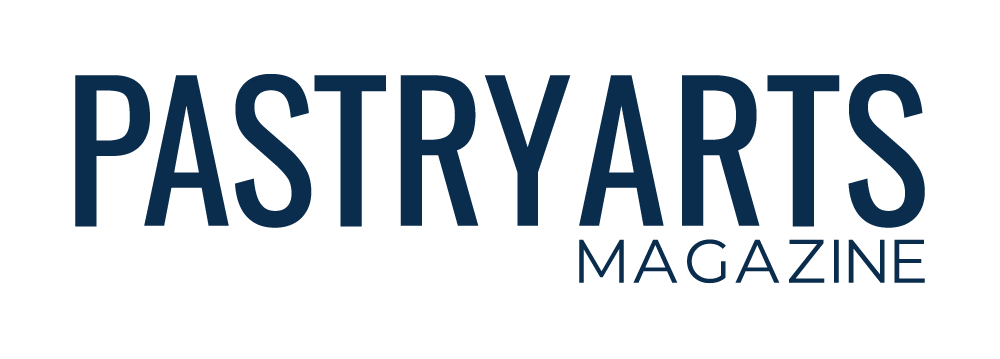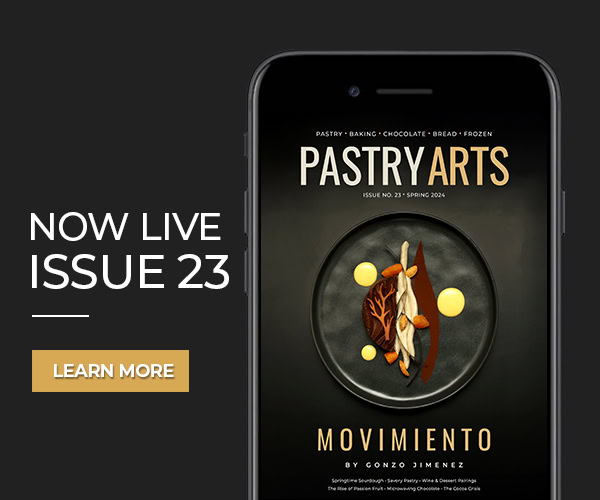(This article appeared in the Spring 2021 issue of Pastry Arts Magazine)
By Shawn Wenner
An honors graduate of Harvard College with a degree in Applied Mathematics and Economics, Joanne Chang left a lucrative career as a management consultant to enter the world of professional cooking. Today she is a pastry chef and the owner – along with her husband Christopher Myers – of Flour Bakery in Boston, with nine locations throughout the city, as well as Myers+Chang, a Chinese restaurant. Throughout her bakery expansion efforts, Chang has also managed to write five cookbooks, the most recent being Pastry Love (HMH, 2019). We recently caught up with her to hear how she juggles her many responsibilities while still maintaining her creative edge, and how she’s managed to make it through the pandemic.
 When opening your first bakery, what was it like transitioning from employee to owner?
When opening your first bakery, what was it like transitioning from employee to owner?
The transition was very different from what I expected. I was a pastry chef at a restaurant. I had a chef as my boss, and a team of pastry cooks. I worked with a bunch of cooks in the kitchen and servers in the front. And I thought to myself, “This is going to be so great when I am the owner and I’m my own boss and I don’t have to report to anybody.” I loved my chef, but I wanted to be my own boss.
I remember unlocking the doors of Flour on opening day and the weight of what I had done hit me. I went from having one boss, my chef and owner of the restaurant that I had been a pastry chef at, to having 12 bosses when I unlocked the door. I opened Flour with 12 employees and I immediately realized that these 12 people are the people I have to please and make happy in order for me to survive. That was a really big wake up call for me in terms of how I managed and how I lead and communicate.
What made it the right time for you to take that leap?
I opened Flour earlier than I probably should have, to be honest. I should have spent more time getting experience, but I was really eager to do my own thing. I also felt like I had something to say and I wasn’t able to say it working in a restaurant or working for somebody else in a bakery. I was very eager to have a platform, and so it was the right time for me from that perspective.
I learned a lot in those first couple of years of Flour. I’m continuing to learn, but the first couple of years were really hard, not knowing how to do almost anything except to bake. I knew how to bake and that was it. I could have spent time trying to get more business and financial background and more management skills.
In hindsight, what’s the one thing you wish you knew before stepping out on your own?
The number one thing is human resources. Meaning, having the ability to manage people. Human resources isn’t just hiring, firing, and training, that’s the basics of human resources. Knowing how to communicate clearly to a group of people, how to inspire and get everybody on the same page as you, I wish I knew that sooner and earlier. I’ve definitely developed those skills over the years but that is crucial to operating a successful business.
You don’t do anything alone. You have a team. If you cannot inspire, motivate, manage, guide and communicate clearly to your team, then your message and voice instantly is muddled. You have a vision for what you want your bakery to be like and you don’t want to see a crappy carbon copy of that out in the world. Once you finally open, you want every single person who works for you to know that vision and to believe in it and to execute on that. The baking is the easy part. When people say, “Oh, but I’m such a great baker.” It’s like yeah, you have to do that, but it’s everything else in order to operate a successful business.
Do you have a formal R&D process baked into the business where you’re constantly testing and developing new ideas?
It’s definitely changed since the pandemic. We used to have a very structured program with a lot of digital platforms to keep us organized. Goals, recipes, pastries, everything that we were thinking about doing was all laid out. Since the pandemic, we’ve had to simplify and streamline. Now it is a process of me and my executive pastry chef, our production pastry chef, and a long-time pastry cook who loves testing recipes, we’re all in this group chat together where we’re throwing ideas to each other. We use Instagram a lot to send pictures to each other and then we just try to come up with a plan. We have natural incentives with holidays and with seasonal menus, and then there’s the occasional pastry that’s out there that we’ve seen or tried that we think would be fun to add. So we put it on a board and we just start experimenting. It’s a weekly process. Our pastry chefs taste or test a couple of recipes, brings it to us to try, we all talk about it and then go back to the drawing board. It’s definitely a very iterative process.
“You have a vision for what you want your bakery to be like, and you don’t want to see a crappy carbon copy of that out in the world.”
What technique or method have you learned along the way that was a bit difficult to fully understand, and what’s your advice for those wrestling with new techniques or methods?
 Chocolate tempering is something that I dabbled with when I was working in New York City with François Payard. He had a chocolate department and I learned how to temper and make all sorts of fun decorations. And then I spent a little time continuing with it when I left Payard, but then I didn’t keep it up, so it’s definitely a technique that I am not confident in and I would love to spend more time just getting more practice.
Chocolate tempering is something that I dabbled with when I was working in New York City with François Payard. He had a chocolate department and I learned how to temper and make all sorts of fun decorations. And then I spent a little time continuing with it when I left Payard, but then I didn’t keep it up, so it’s definitely a technique that I am not confident in and I would love to spend more time just getting more practice.
If you have a technique that you’re just not able to master, it’s all about devoting the time and the practice. Nowadays there are so many opportunities online to be able to watch videos. There are endless videos for any subject that you want, and I think that if you devote the time and the focus you can get better. No pastry technique is impossible to master, it’s just a matter of focusing yourself. In today’s day and age with so much coming at us in the world, it’s hard to stay focused. That’s something that I love about pastry, it does force you to focus. I think any pastry chef has that ability within them, and it’s just a matter of focusing on that ability to hone your attention to something that you want to learn.
How about a production tip you learned along the way that you now incorporate in your own processes?
Something we started three or four years ago when making croissants, because it’s always a challenge to try to get the butter to the right shape, but the lid of a plastic Cambro is exactly the right size for the butter lock-in for our croissant. So we heat the butter and scrape it out and press it onto the lid. We’ve lined the lid with plastic wrap and then we press the butter onto that lid and straighten it out with a bench scraper and make it nice and square, and then just plop it straight onto the croissant and it fits perfectly. That’s been a game changer for us in terms of getting really neat, square, even corners for our croissant.
Many people pivoted as the pandemic was taking shape. Something you did was create “kits” for customers to purchase and bake with you. Can you walk us through that decision and process?
When we closed down for about a month and then slowly started to reopen, we went from seeing thousands of people a day to dozens. We knew they were all at home and not able to come see us. Our goal at Flour is to make people happy with great pastry, and since they couldn’t come see us, then we wanted to figure out a way that we could come to them. So we came up with a kit from one of our most popular items, a Low-fat Vegan Chocolate Cake. We sold dozens of these little cupcakes at each of the bakeries pre-pandemic. The kit was for making this cake at home. We put all the ingredients together and filmed a little video showing how to make it. I put it on Instagram and we got hundreds of people who were buying these kits and baking this cake. Previously, Flour had just been in Boston, but now with these kits we can ship nationwide. After the first kit it was so successful we did a cookie, then a bread, then a pie, and then it just took a life of its own.
For those thinking of creating kits of their own, what’s your best advice after going through that process?
We learned that the videos are really helpful, even if you think something is easy to make. The first kit, the Low-fat Vegan Chocolate Cake, is literally mixing dry ingredients with wet ingredients, stirring it together and pouring it into a cake pan. But you would be surprised at how many people really want that much direction.
Having a strong social media presence has been really helpful. Then investing in the time to take really good pictures so that you can market it on social media, and you can physically put pictures in the kits so people can see what it is that they’re going to make. People are really drawn to the visuals, so if you can put a beautiful picture of a fluffy, buttery, sticky bun, people are going to want to buy that.
“Our goal at Flour is to make people happy with great pastry, and since they couldn’t come see us, then we wanted to figure out a way that we could come to them.”
 Last year you decided to increase your e-commerce offerings and that drastically increased sales. Can you walk us through that decision and process?
Last year you decided to increase your e-commerce offerings and that drastically increased sales. Can you walk us through that decision and process?
We took a look at our product line, at the things that we ourselves would hold for two, three or four days, and said, “What can we actually package and ship?” So we looked at every single thing that’s in our fridge and freezer.
All you really need is a good picture, packaging, a little bit of physical space to package everything, and some printed materials if you want to make it look really pretty. But it’s relatively easy to get going once you’ve identified the things that you think people will gravitate towards.
Just look at your product line. What are the things that your customers love coming to you for? Because if your local customers love that item, chances are people on other side of the country will love it too, it’s just a matter of getting the word out to them that they can try and order it.
People are really drawn to the visuals, so if you can put up a beautiful picture of a fluffy, buttery, sticky bun, people are going to want to buy that.
What was one of the greatest lessons you learned last year while we were in the thick of the pandemic?
The thing that struck me the most has been the resilience of our team. Being able to rely on them and reach out to them [for ideas]. The kits, the e-commerce [expansion], and the pop-ups, it’s not like I came up with these ideas on my own in a little room and presented it to people. Our director of ops and I spent a lot of time together talking to our teams saying, “We’ve got to get more people here, we’ve got to get our food out to people, what can you do, or what do you think we can do?” Knowing that the team was in it with us to try and figure out how we keep Flour and Myers+Chang afloat was such an amazing lesson. We knew we had amazing teams, we knew they were great at what they do, and I think just knowing that we can and should reach out to them for more than just whatever their job is. We’ve always been open to feedback, but the lesson was being so open to feedback, and recognizing that the people who are day-to-day making, cooking, shipping, packing – they’re the ones who probably have the answers to so many of your questions.
Finally, where do you see things heading in relation to the world of baking and pastry right now?
Everyone’s saying there’s pent-up demand, so I’m excited to see when all that demand is released. I think with the pandemic everyone’s been baking a lot at home, which has been really exciting. And because of that I think people’s expectations will be higher, which is a good thing. I think that if you can make something great at home, you don’t want to then spend money at a bakery if you can make it just as well. I think it will push all of us to make sure we are performing at the best of our ability. This is what we do for a living, so hopefully what we do is better than what the average home baker can make at home. That’s always been the case, but I’m guessing now that there are so many people who have been baking at home, it will be even more so.
Photo Credit: Kristin Teig, Leah Willis, Lottie Hedley










You must be logged in to post a comment.